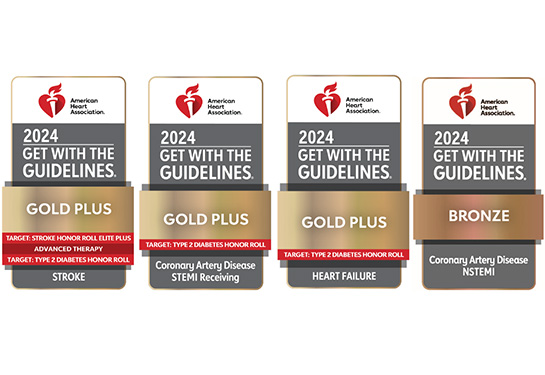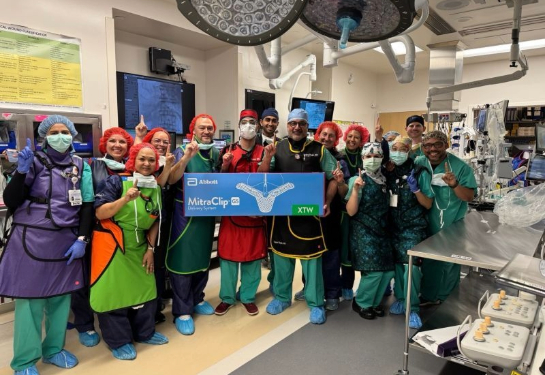UC Davis Health is nationally recognized for high-quality heart and stroke care
The American Heart Association honors medical center for dedication to life-saving care and best practices
UC Davis Medical Center has received multiple awards from the American Heart Association for demonstrating a commitment to following up-to-date, research-based guidelines for treating heart disease and stroke. These efforts ultimately lead to more lives saved, shorter recovery times and fewer readmissions to the hospital.
Every 40 seconds, someone in the United States has a stroke or heart attack, and heart disease and stroke are the No. 1 and No. 5 causes of death, respectively. Studies show patients can recover better when providers consistently follow treatment guidelines.
The awards are part of the Get With The Guidelines program run by the American Heart Association and American Stroke Association. The program helps ensure patient care is aligned with the latest evidence- and research-based guidelines.
UC Davis Medical Center qualified for Get With The Guidelines, by demonstrating its commitment to high-quality care.
The medical center received these achievement awards:
- Get With The Guidelines — Heart Failure Gold Plus Award
- Target: Type 2 Diabetes Honor Roll
- Get With The Guidelines — Coronary Artery Disease STEMI Receiving Gold Plus
- Target: Type 2 Diabetes Honor Roll
- Get With The Guidelines — Stroke Gold Plus
- Target: Stroke Elite Plus Honor Roll
- Target: Type 2 Diabetes Honor Roll
- Target: Stroke Advanced Therapy Honor Roll
- Get With The Guidelines — Coronary Artery Disease NSTEMI – Bronze
Heart Failure Gold Plus
Heart failure is a lifelong condition in which the heart muscle cannot pump enough blood to meet the body's needs for blood and oxygen. There is no cure for heart failure, but patients can achieve a good quality of life by working with their health care team to create and stick with a plan. This may include medication, symptom monitoring and lifestyle changes.
The Get With The Guidelines - Heart Failure Gold Plus quality achievement award is earned by hospitals who improve outcomes for patients with heart failure. This means reduced readmissions and more healthy days at home.
Coronary Artery Disease STEMI Receiving Gold Plus
Coronary Artery Disease STEMI, or ST elevation myocardial infarction, is a heart attack that occurs when the coronary artery feeding into the heart is completely blocked. A STEMI is the most serious and deadly type of heart attack.
Recognition with a STEMI Gold Plus quality achievement award is designed to showcase hospitals that provide 24/7 support for STEMI. These important facilities coordinate with a network of referring hospitals and emergency medical services to provide guideline-directed STEMI and NSTEMI care.
Stroke Gold Plus
A stroke occurs when a blood vessel that carries oxygen and nutrients to the brain is either blocked by a clot or bursts. When that happens, part of the brain cannot get the blood and oxygen it needs, so brain cells die. Early stroke detection and treatment are key to improving survival, minimizing disability and accelerating recovery times.
Get With The Guidelines - Stroke is an in-hospital program for improving stroke care by promoting consistent adherence to guidelines. This can minimize the long-term effects of a stroke and even prevent death. Hospitals receiving Gold Plus quality achievement awards meet specific criteria that reduce the time between an eligible patient’s arrival at the hospital and treatment for the cause of the stroke.
Coronary Artery Disease NSTEMI Bronze
Coronary Artery Disease NSTEMI, or non-ST-elevation myocardial infarction, is a type of heart attack that usually happens when the heart's need for oxygen cannot be met.
Recognition with a NSTEMI Bronze quality achievement award is designed to showcase hospitals who meet guideline therapy recommendations in treating patients presenting with NSTEMI heart attacks.




